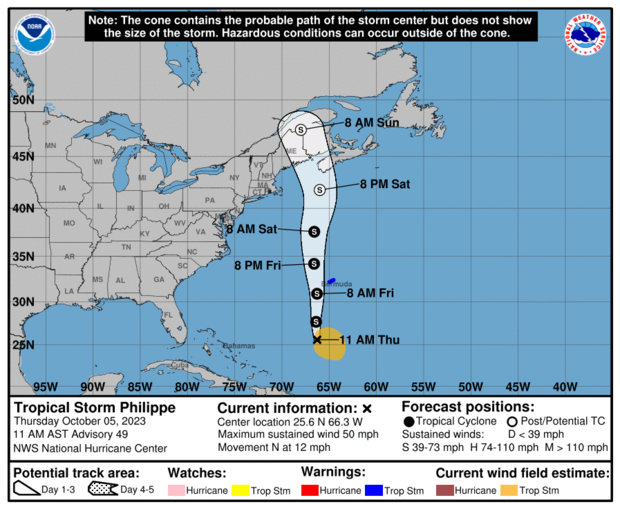Tropical Storm Philippe is on a path to New England and Canada
Tropical Storm Philippe could bring another round of wind and rain to parts of the northeastern United States and southeastern Canada this weekend, as the weather system continues on a path heading north in the Atlantic, forecasters said Thursday.
Philippe was swirling over the southern Atlantic on Thursday morning, about 455 miles north of St. Thomas and 520 miles south of Bermuda, the National Hurricane Center said in an advisory. At the time, the storm was packing maximum sustained winds of 45 miles per hour and steadily tracking north at around 10 mph.
Tropical Storm Philippe path and forecast
Forecasters expect Philippe to pick up speed as it travels toward the U.S. Northeast and Canada over the next several days, with the storm's center likely to pass near Bermuda Friday before approaching eastern New England and Atlantic Canada on Saturday.
The storm is also expected to strengthen gradually as it picks up speed, but meteorologists anticipate Philippe will weaken to a post-tropical cyclone on Saturday as it nears New England and Canada.
"Philippe is expected to move over portions of Atlantic Canada and eastern New England as a post-tropical cyclone this weekend," the National Hurricane Center said Thursday morning. "Regardless of Philippe's intensity or structure, interests in those areas should be prepared for the possibility of strong winds and heavy rainfall and monitor statements from their local weather office."

Forecasts have remained fairly steady for Philippe over the last 24 hours, but landfall along the coast of New England and Canada may not happen until as late as Sunday, CBS News weather and climate producer David Parkinson repors, noting that the storm will slow down slightly as it nears coastal Maine. Philippe could still soak much of northern New England with three to four inches of rain starting on Saturday, Parkinson said, with rain and windy conditions expected as far south as New York City.
Ahead of its track up the East Coast, Philippe is expected to bring tropical storm conditions to Bermuda by Thursday night, with three to five inches of rain expected through Friday, the National Hurricane Center said. A tropical storm warning is already in effect for the island, which will start to see heavy rain earlier on Thursday, potentially accompanied by scattered flash flooding, while rainy conditions in Puerto Rico and the U.S. and British Virgin Islands gradually start to abide.
Even so, meteorologists said dangerous surf and swells linked to Philippe will continue to affect parts of the Atlantic coasts of the northern Leeward Islands, the Virgin Islands and Puerto Rico throughout Thursday and into Friday. Large swells on Bermuda from a different weather system are forecast to grow as Philippe approaches the island later in the day, the hurricane center said, adding that the confluence of conditions will likely cause life-threatening surf and rip currents.
Tropical cyclone is an umbrella term that refers to any weather phenomenon characterized by rotating, low-level systems of clouds and thunderstorms that form over tropical or subtropical waters, according to the National Oceanic and Atmospheric Administration. Once a tropical cyclone's maximum sustained wind speeds exceed 39 mph, it is considered a tropical storm. A post-tropical cyclone is one that "no longer possesses sufficient tropical characteristics to be considered a tropical cyclone," the National Weather Service writes, warning that it can carry strong wind and heavy rain either way.
- In:
- New England
- National Oceanic and Atmospheric Administration
- Tropical Storm
- National Hurricane Center
- Canada
Disclaimer: The copyright of this article belongs to the original author. Reposting this article is solely for the purpose of information dissemination and does not constitute any investment advice. If there is any infringement, please contact us immediately. We will make corrections or deletions as necessary. Thank you.




